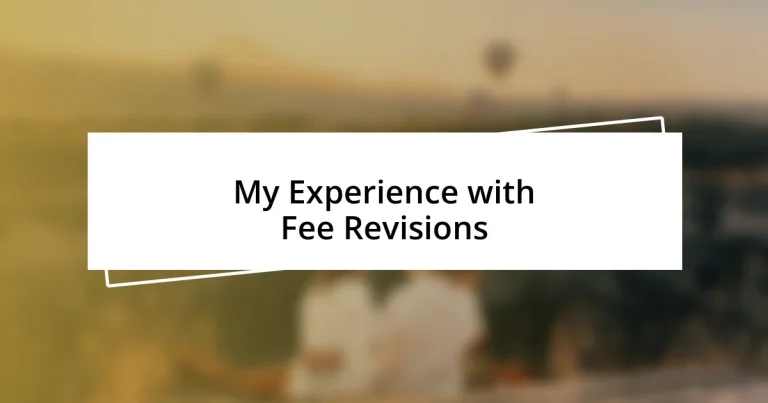Key takeaways:
- Fee revisions can arise from project scope changes, unforeseen complexities, or resource availability; proactive communication helps mitigate confusion.
- Successful negotiations involve open dialogue, emphasizing mutual benefits, and being patient to foster collaborative solutions.
- Documentation and follow-up are essential; clear records prevent misunderstandings and solidify agreements, enhancing trust between parties.
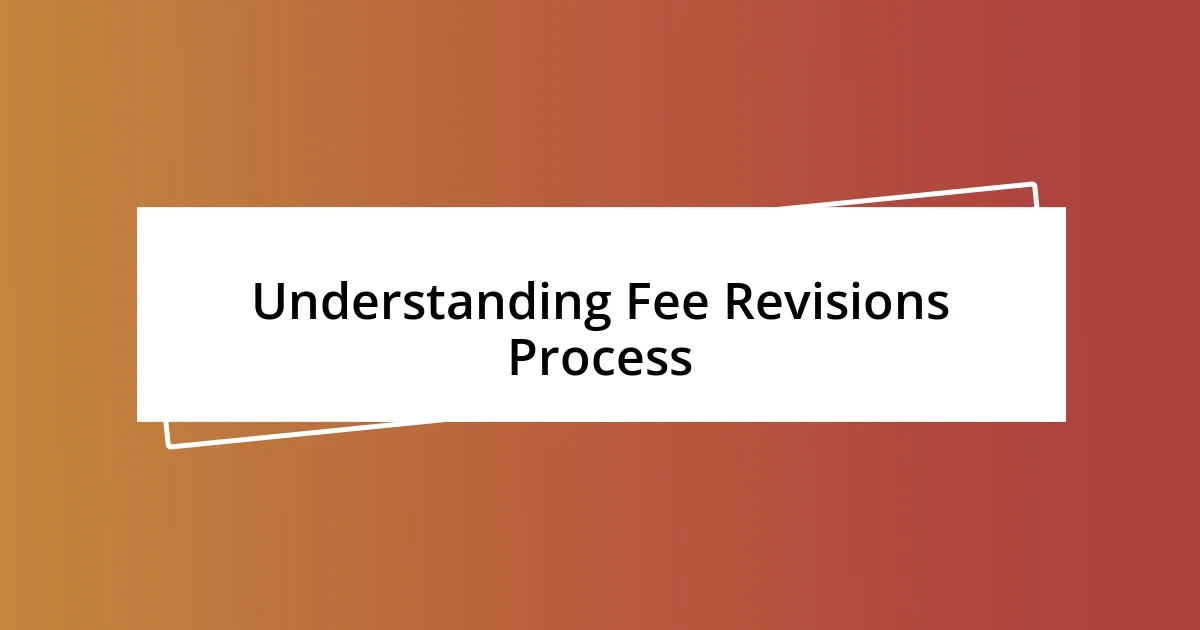
Understanding Fee Revisions Process
Understanding the fee revisions process can feel overwhelming at times. I remember the first time I encountered it; I was left questioning what justified the changes. It’s normal to feel a bit lost when you’re facing adjustments that seem to come out of nowhere.
Once I delved deeper into the reasons behind the revisions, it became clear that factors like project scope changes or unexpected complexities often played a significant role. Have you ever been surprised by a change in fees? I definitely have, and it was a learning moment for me, understanding how important transparent communication is throughout the entire project.
Navigating the fee revision process doesn’t have to be daunting if you know what to expect. I learned that consistently discussing the project’s direction with your service provider can help prevent confusion. Wouldn’t it be easier if we addressed these potential changes head-on before they arise? In my experience, proactive communication is key to a smoother process and can significantly ease any friction that might emerge.
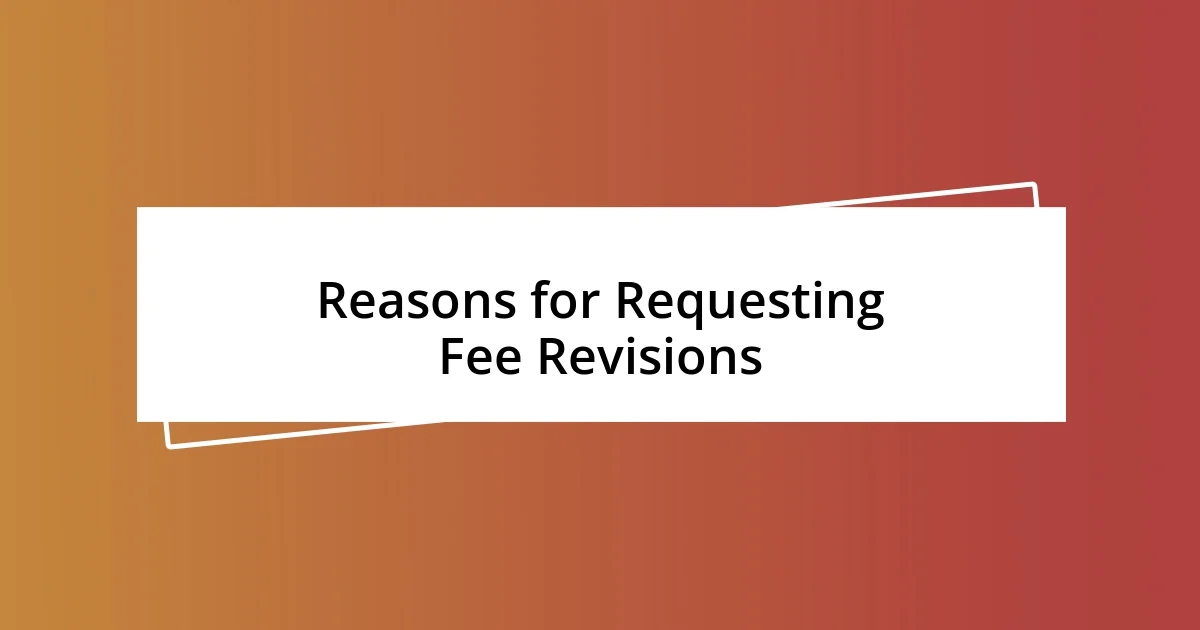
Reasons for Requesting Fee Revisions
When it comes to requesting fee revisions, several factors often contribute to the decision. I remember a project where the initial estimate was based on a much simpler scope of work. As the project progressed, unforeseen complications arose, requiring additional resources and time. It became clear that the original fees no longer reflected the actual workload, prompting a revision request.
Here are some common reasons that might lead to a request for fee revisions:
- Scope Changes: When clients alter the project’s requirements, it can significantly impact costs.
- Complex Issues: Unanticipated complexities may arise that necessitate additional effort and expertise.
- Resource Availability: A shortage of key personnel or resources can lead to increased fees due to the need for specialized skills.
- Market Fluctuations: Changes in market conditions affecting materials or labor costs may prompt adjustments.
- Extended Timelines: If a project drags on beyond the original schedule, the costs may need to be revisited.
Reflecting on my experience, clear communication about these factors is crucial. I’ve learned that discussing potential scenarios upfront helps to minimize surprises.
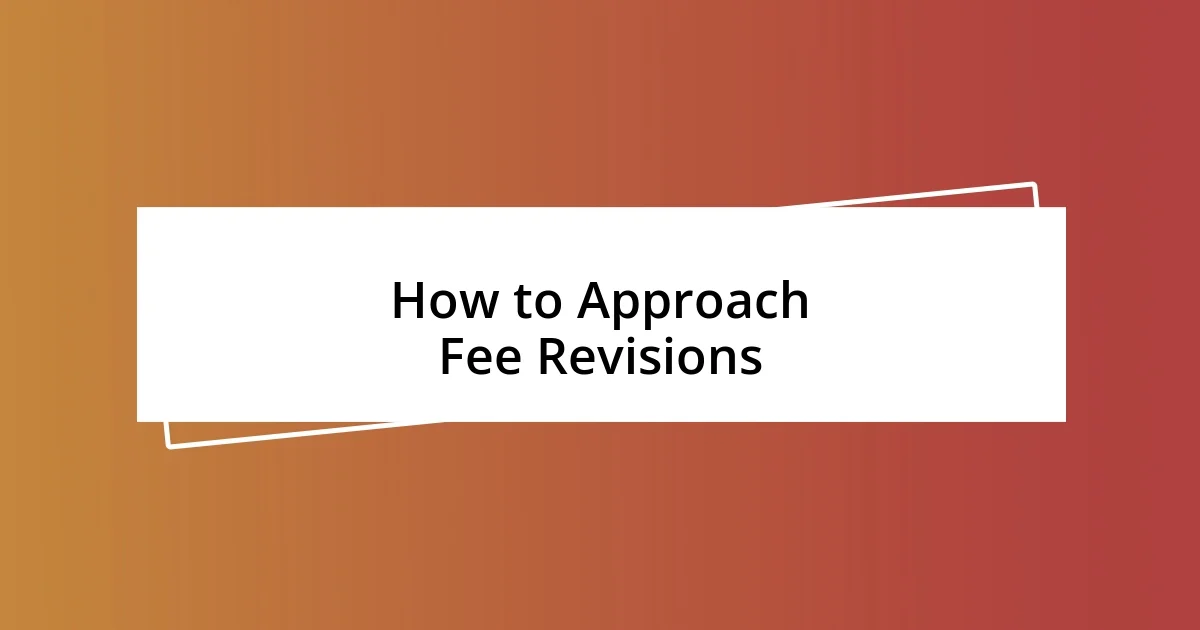
How to Approach Fee Revisions
When considering fee revisions, it’s vital to approach the conversation with an open mind. I recall a time when a fee adjustment was proposed, and I initially felt defensive. However, taking a step back and asking for clarification allowed me to understand the reasoning better. It’s interesting how just a little curiosity can transform a tense situation into a collaborative dialogue. Have you ever found yourself in a similar scenario?
Next, I recommend outlining your priorities before discussing any revisions. For instance, during one project, I took time to clarify what aspects of the work were most important to me. This preparation made me feel more grounded and empowered during the conversation. It’s all about finding a balance between understanding the provider’s perspective and advocating for your own needs.
Lastly, I can’t stress enough the importance of being solution-oriented. There was a moment in my career when unexpected fees arose due to late requirements. Instead of getting upset, I focused on how we could adjust the project timeline or scope to make things work. This mindset shift not only eased my stress but ultimately fostered a stronger relationship with my service provider.
| Approach | Description |
|---|---|
| 1. Open Communication | Foster an environment where both parties can express their concerns and insights. |
| 2. Prioritize Needs | Clearly identify what aspects of the project matter most to you before discussing fees. |
| 3. Solution-Oriented Mindset | Focus on finding mutually beneficial solutions during fee discussions. |
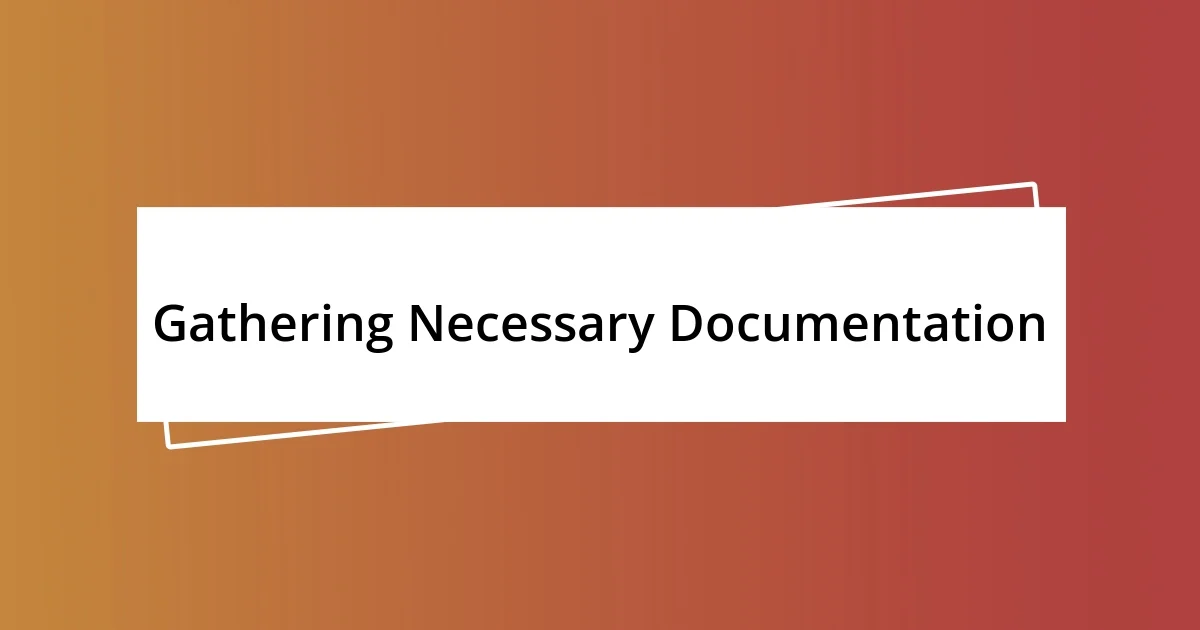
Gathering Necessary Documentation
When I needed to gather documentation for a fee revision request, I realized just how crucial it was to have everything organized. I dug through my project files, pulling together initial contracts, records of communications, and notes highlighting changes that had taken place. It felt a bit overwhelming at first, but once I had everything laid out, I found that it created a clear narrative about why the revision was necessary. Have you ever felt that chaotic rush of looking for just the right piece of evidence to support your case?
It’s important to ensure that all relevant information is accurate and comprehensive. I learned this the hard way during a project where I neglected to include a few key emails. Those missed messages ended up being significant, as they outlined changes in client expectations. Once I started double-checking everything, the entire process became smoother, and I felt more confident presenting my case. In my experience, precise documentation speaks volumes and can help in making a compelling argument.
Lastly, don’t overlook the importance of timestamps and logs. They can serve as a timeline of events that lead to the fee revision request. For example, I often note when specific changes were communicated or when resource challenges came into play. This helped me contextualize the revision request and clearly illustrate its necessity. Have you developed any methods for tracking changes during your projects? This attention to detail not only eases the discussion about fees but also builds trust and transparency with clients.
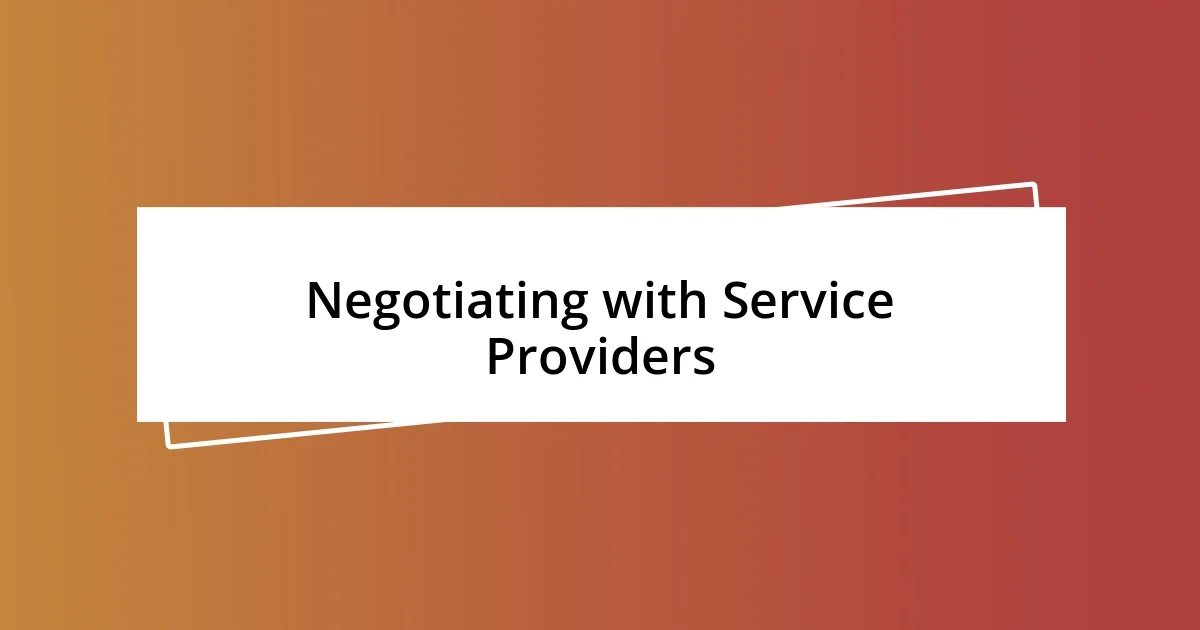
Negotiating with Service Providers
Negotiating with service providers can feel daunting, but I believe it pays off to approach these discussions as partnerships. I once faced a situation where my initial proposal for a fee adjustment seemed unreasonable to the provider. Instead of backing down, I shared my perspective honestly, explaining the budget constraints I was grappling with. This transparency opened up a dialogue where we could genuinely brainstorm solutions together, ultimately leading to a compromise that felt fair to both sides. Have you ever found that honesty can pave the way for more productive negotiations?
One key strategy that I found effective is to emphasize mutual benefits during negotiations. In a recent project, I was negotiating with a developer over extra costs associated with last-minute changes. Rather than simply rejecting their fees, I highlighted how a smoother process could result in faster delivery and increased client satisfaction for both of us. By shifting the focus from costs to outcomes, we not only found a middle ground but also strengthened our working relationship. Have you ever tried reframing the conversation to align interests?
Additionally, I’ve learned that patience is crucial in negotiating with service providers. The first time I encountered a challenging fee dispute, I jumped directly into aggressive negotiations, which only sowed discord. However, reflecting on that experience, I now understand that allowing some space for contemplation can lead to more thoughtful discussions. When I revisited the conversation after some time, both parties were more relaxed and open to finding a solution. Isn’t it fascinating how time can transform a heated discussion into a cooperative exchange?

Common Mistakes to Avoid
One of the most common mistakes I’ve seen—and made myself—is the failure to listen actively during discussions. In my early negotiations, I was often too focused on presenting my argument that I missed critical points from the other party. I vividly remember a situation where I cut off a service provider mid-sentence, only to realize later that they had valuable insights regarding cost-saving solutions. Would you believe how much smoother things could have been if I had simply paused and listened?
Another pitfall is rushing to conclusions without fully understanding the situation. I recall a project where assumptions led me to reject a service provider’s fee changes outright. After some reflection, I took the time to dig deeper and discovered that unforeseen circumstances had significantly impacted their ability to deliver. This taught me the importance of gathering all relevant information before reacting—how often do we jump the gun when we could pause for clarity instead?
Lastly, failing to document agreements can lead to misunderstandings and disputes. There was an instance when I didn’t write down our agreed-upon terms, thinking it would all “be fine.” But when discrepancies arose weeks later, I found myself caught off guard, scrambling to recall details. This experience hammered home the significance of putting things in writing—are you someone who thinks a verbal agreement is enough? In my opinion, a written record not only protects both parties but also creates a sense of accountability that can be invaluable for future interactions.

Final Tips for Successful Revisions
When it comes to successful revisions, clarity is everything. I remember a project where I was unsure about certain fee changes, and instead of seeking clarification immediately, I let my confusion linger. This only added to my anxiety. In hindsight, if I had asked questions upfront, I could have alleviated my concerns and fostered clearer communication—have you ever wondered how a small inquiry might have saved you hours of stress?
It’s also important to approach revisions with an open mind. I had an experience where I was fixated on a specific fee structure, thinking it was my only viable option. I finally took a moment to consider alternatives suggested by the service provider. Not only did this lead to a better price, but it also created a stronger partnership moving forward. Isn’t it remarkable how flexibility can turn a challenging situation into an opportunity for collaboration?
In my revision journey, I’ve found that following up is key. There was a time I assumed everything was settled after a conversation, only to realize weeks later that details were overlooked. A simple follow-up email could have confirmed our agreement and ensured we were on the same page. So, how often do you make a habit of checking in post-negotiation? I believe these small gestures can emphasize commitment and reinforce trust between both parties.












